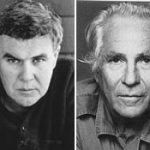The Australian Literary Review has published this review of Raymond Carver’s short stories in their unedited, pre-Gordon Lish versions, which has been released under Carver’s original title, Beginnings. The article uses the new book to explore the relationship between editors and authors in contemporary publishing.
May I start by congratulating The Australian on providing space and time for intelligent reflection on an aspect of book publishing that is usually treated with undue reverence due solely to its invisibility. It’s wonderful to read quotes from authors and editors alike on the subject. The author-editor relationship is so various and complex in its dynamics, and usually so irrelevant to those not directly involved, that it mostly occurs behind closed doors, like a marriage. Text’s Michael Heyward likens it to a confessor and priest.
Back towards the end of the 20th century, I spent a good few years working in-house as the editor of the Picador imprint at Pan Macmillan Australia. In that time I had the opportunity of working with some wonderful writers of fiction and non-fiction, and, it must be said, with authors who were published for reasons more complicated than just the quality of their words on the page. My experience was that, no matter whether I loved or loathed any particular manuscript, the process of editing their work – which incorporates everything from structural changes and spell-checking to blurb-writing and liaison with typesetters, publicists, sales reps, your boss and her boss, in addition to time on the phone and in-person with the author (when conveniently co-located) – took about the same amount of time.
Delia Falconer makes the point that editing is a thankless and – when done properly – an invisible task:
When you read a book, you have no idea how much of the editor’s advice the writer used, or how they used it.
As an editor I had the unpleasant experience of sweating blood for weeks over a debut novelist’s manuscript, only to see him reject every single change I had suggested (in pencil). I also had the marvelous experience of working with authors – who were usually not publishing debutants – who responded with openness and imagination to the suggestions I proposed to them. My approach as an editor was always to put myself as much as possible in the author’s shoes, to try to understand what they were trying to achieve and to help them close any perceived gaps between their vision and the unedited manuscript. And, it must be said, I loved to cut. Even now I can’t stop reading books and thinking, I would have cut that sentence/paragraph/chapter. I for one would have tried to persuade Christos Tsolkias to lose the Manoly chapter of The Slap. But the novel has since won many awards and is a great achievement, so who am I to quibble now?
Ultimately, however, editing other people’s work was not for me. I had chosen to edit other people’s words instead of write my own, and that decision took its toll. My authors generally enjoyed working with me; I ended up with regular migraines and resigned after three years. Authors are best served by editors who love to edit. Thankfully in Australia and elsewhere there are plenty of those. UQP‘s Alexandra Payne, who edited my book, is one. She made a relatively small number of highly astute comments, pointed to a few possible solutions, and left me to figure it out.
James Bradley, who was quoted in the ALR article, has since posted these thoughts in response to it. He writes:
I think what’s really interesting though is what our anxiety about editorial standards tells us about our attitudes to writing, and more particularly how difficult we find it break free of Romantic notions of the artist as solitary genius when we’re talking about authors and authorship. Because in the end that’s what this whole conversation is really about: our unease with accepting that literary fiction and non-fiction are not, in many ways, all that different to more collaborative forms such as television or film.
I’m not sure I’d go as far to say that the level of collaboration between author and editor on a book is similar to that which is expected and ‘natural’ in TV/film, but I haven’t worked in those other forms. Without an author’s manuscript, a book’s editor has nothing to go on. An editor revises and makes insightful suggestions, but does not create from scratch. From what I’ve read of the relationship between Lish and Carver, the editor often forgot that he was not the author of those stories.
I think Carver’s widow, who is responsible for the unedited Carver stories (re-)entering the literary marketplace, has done the world of writing and publishing a huge favour. Wannabe editors and teachers of writing can pore over the original and edited versions of Carver’s stories, plainly see what was changed, debate the ethics of editing, and learn to write better. Beginnings will have a long shelf-life as a reference book more than anything else, I think. Carver’s reputation is impermeable at this point. Editing is an imperfect art at best, and due to the commercial context in which it operates, ambivalent: quixotic and practical at the same time, idealistic and also subject to time-constraints. Ultimately, aren’t we all?
